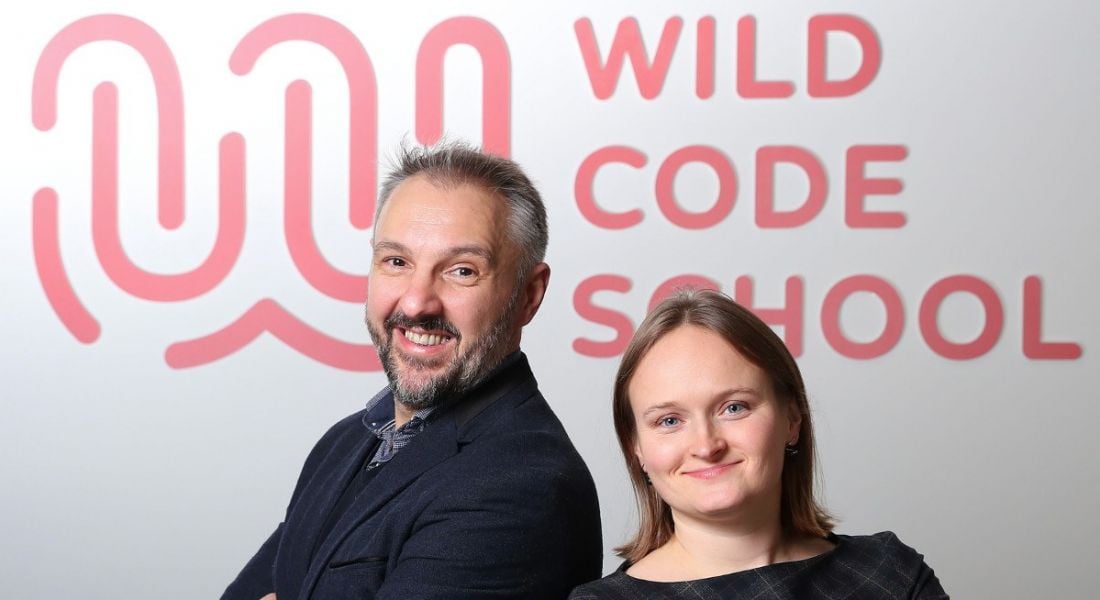Wild Code School co-founder Anna Stépanoff discusses the origins of the institute and its unique name.
Coding, software and data analytics are all sectors teeming with opportunities today. But there’s a significant shortage of skills that’s holding companies back, says Anna Stépanoff.
Stépanoff founded Wild Code School five years ago with Romain Coeur while working as a consultant at McKinsey. It was there she realised that “the lack of tech talent was actually quite a problem for tech companies”, and set about finding a way to try and resolve the issue.
Here, she discusses the development of the school and what prospective students can expect of its new Dublin campus.
What was the motivation behind setting up Wild Code School?
I’m not a developer and I don’t come from a technical background. Before creating the school, I was a consultant at McKinsey, so I was working with different companies and I was just confronted with the fact that the lack of tech talent was actually quite a problem for many companies. That was an obstacle for their growth.
I realised that our current traditional university education application was not actually enough, was not sufficient to produce enough talent to do it in the relevant manner. So, I felt compelled to try and reinvent the approach to teaching, especially for these technical professions. Especially when things move quite quickly – there is a new technology that would appear every year or, let’s say, maybe six months, which means that you need to update the curriculum all the time.
So, the best thing for a person who would like to become a developer is to actually learn the skills in a short programme, and to learn just the most recent technologies and go apply them in the real world instead of going for several years when, actually, what you learn in your first year will be outdated by the end of your studies. And that’s quite a problem to me.
What does attending Wild Code School involve?
The course is five months and it’s currently a full-time programme. So in Dublin, we’ve opened up a programme on software development in JavaScript, React and Node so that people who learn this would become software developers after five months. That’s the goal.
People might come from various other big roles – we do not expect people to have any particular technical background before joining the programme. It’s sufficient in order to retrain and become a professional in the field.
Do you keep in touch with alumni of the course?
Definitely. We actually have a community of former students, which is called Wild Forever. We keep in touch on Slack and also have a newsletter for our former students. And we are looking at putting in place some other tools to keep in touch with the community because, basically, people really need to continue learning all the time. And what they really need is this possibility to talk to other people, other professionals, to exchange best practices.
So, former students continue learning together. It’s a global learning community, not just in one particular country, but across different countries, because we are currently present in 11 countries in Europe.
Who are the teachers at the school?
I think we put lots of effort into finding the right people. I think the importance of having the right people to run the school is huge because learning is about human interaction. It depends a lot on the quality of the trainer, or the person who would accompany the student.
Where have people worked after the course?
Some people have gone on to work in something really unexpected. Mostly, students go on to developer positions, and that’s really our focus. But there are some people who will do some different things. There are some people who would found start-ups. So, they might not become developers themselves, but they know how to recruit developers. They know how to talk to developers. And this is extremely important.
There are some people who would do the course and then continue to become a website designer. And I think that knowing how to code can be very helpful in their job as well. We have some journalists actually also taking the course and then trying to implement the knowledge. Like, for example, in data gathering and sourcing.
Some people from marketing might do it as well because marketing is becoming more and more data driven. So they might want to write some scripts, to collect data or to analyse data effectively. And so, they are quite interested in ways of applying technical knowledge, not necessarily just in the straightforward way.
Do you have any advice for someone thinking of applying?
I think the first thing to do is really just to try out doing some exercises. Currently there are so many resources available online. Potential candidates can get access to some guiding exercises on our website for free. And there is no deadline for finishing them. So they can actually just try to see whether they work for them. If not, no problem. I think it’s really important to experiment.
Why the name Wild Code School?
Everyone asks this question! Actually, there are two meanings behind the name. First one is that it means kind of alternative personalities and alternative to traditional education.
And the other reason is actually that we started initially in a small village in France. The first campus was in the countryside. And so we had some folks around and we thought that we were quite wild. There are some start-ups that start in their garage, and we started in the countryside. So, we decided to inscribe it into the name of this school.
And then at some point we thought that maybe we should change it because we were not that much in the countryside any more. Most of our campuses are in big cities actually today. But we saw it as a great name because this is part of our spirit and there is some kind of fun attitude. We all value passion – passion for technology, passion for education.
So it describes well what we are.




